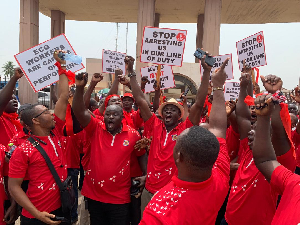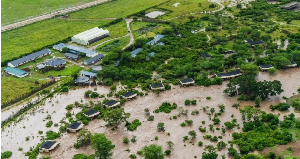Regional News of Tuesday, 18 April 2006
Source: GNA
Basic schools enrolment in dormaa goes up
Aboabo No.4 (B/A), April 18, GNA - Enrolment in basic schools in Dormaa rose by 29 per cent from 31,000 to 40,000 in the 2005/2006 academic year as a result of the introduction of the capitation grant scheme.
Mr Kofi Sarfo Kantanka, District Director of Education, who disclosed this at the People's Assembly at Aboabo Number Four in the district said the grant had paved way for school dropouts and some key personalities, including traditional leaders to seek re-admission of their wards into basic schools.
Many speakers at the Assembly described the scheme as an outstanding legacy of the NPP government, when Mr Kantanka was answering a question on the development of formal education in the district.
Mr Ignatius Baffour Awuah, Brong Ahafo Regional Minister designate, explained that the Peoples' Assembly concept was in fulfilment of the government's campaign promise to make governance accessible to all Ghanaians, irrespective of social status, in the comfort of their communities.
He said the quest for good governance would remain a mirage, if the people, who constituted the hub around which the process evolved, were not given the opportunity to meaningfully participate in decisions that would affect their lives.
During question time, it became apparent that the people would appreciate a split of the district, which comprises 337 communities, into two to speed up development.
Another issue that the questioners dwelt on and which attracted public disaffection was the non-performance of unit committees and the town/area councils in the district.
They attributed the waning of communal spirit and the growing apathy of the people towards their tax obligations to dormant and ill-supervised local government structures in the area.
The people therefore, called on the government to consider opening a debate on whether the unit committees, Assembly Members and counsellors should be remunerated to make them more pro-active in the discharge of their duties.
Squadron Leader Benjamin Anane Asamoah (rtd), Dormaa District Chief Executive, announced that the Assembly had received 5.6 billion cedis as its share of the District Assemblies Common Fund for 2005.
He said the amount was "woefully inadequate", considering the number of communities in the district and their material and human resource demands.
The DCE called for the diversification of revenue mobilization strategies to revamp the current low internal generated revenue status of the Assembly.
He called on people in the district to embrace unity and adopt a non-partisan approach to communal labour, while government made pragmatic efforts to reduce poverty and fulfilled its side of the national development contract.
Squadron Leader Asamoah assured the people that politicians and traditional authorities would make the necessary inputs towards the creation of a new district for Dormaa to lessen the current pressure on the Assembly.
Present at the function were the Member of Parliament for Dormaa West, Mr Yaw Asiedu Mensah, Mr Kwame Twumasi Awuah, Sunyani Municipal Chief Executive, Mr Kwabena Kyereh, Berekum District Chief Executive and Mr Prince Donyina, Techiman Municipal Chief Executive.










